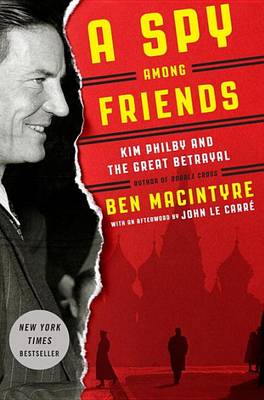
viking2917
Written on May 20, 2014
A Spy Among Friends, by Ben Macintyre, joins the ranks of many non-fiction books about the master spy Kim Philby (the above line from my review of Knightley’s The Master Spy, so far the definitive biography of Philby). As an avid reader of those, as well as the more fictionalized accounts (including the simply amazing Declare by Tim Powers), I was delighted to receive a copy of A Spy Among Friends from the Library Thing early reviewers program.
A Spy Among Friends is a deeply researched and footnoted work that covers the entirety of Philby’s career as a mole or double agent. With so many works about Philby available, including Philby’s own (likely disingenuous) autobiography, why write a new one? Or as a reader, why read this one?
What is unique about A Spy Among Friends is the deep focus on the relationship between Philby and Nick Elliott, the MI6 Officer who was life-long friend and protector of Philby, until he ultimately came to believe Philby was a traitor and confronted him for a confession in Beirut (or, allowed him to escape to Moscow as some believe):
As night falls, the strange and lethal duel continues, between two men bonded by class, club, and education but divided by ideology; two men of almost identical tastes and upbringing but conflicted loyalties; the most intimate of enemies. To an eavesdropper their conversation appears exquisitely genteel, an ancient English ritual played out in a foreign land; in reality it is an unsparing, bare-knuckle fight, the death throes of a bloodied friendship.
Macintyre’s focus on this relationship allows him to provide significantly more color than other works on Philby. He also captures the deep “Englishness” of the entire affair - the social strata, the clubs, the schools, the relationships that would allow Philby to escape unnoticed in plain sight for so many years, because simply nobody would believe a member of their “set” could do such a thing. Even the names ring with “Englishness” - Albania revolution trainer Lieutenant Colonel David de Crespigny Smiley; journalist Hester Harriet Marsden-Smedley; MI6 Chief of Staff Sarah Algeria Marjorie Masse and Ambassador to Turkey Sir Hughe Montgomery Knatchbull-Hugessen.
The intelligence community in Britain at the time was intimately intertwined with high society and high achievers and Macintyre captures this well. Flora Soloman was an early friend to Philby and ultimately responsible for outing him; her son went on to found Amnesty International. Elliott knew Ian Fleming, the creator of James Bond, and put ashore an operative in full evening dress inside a rubber diving suit, an escapade which more or less made its way into the Bond flick Goldfinger. Both Philby and Elliott knew Graham Greene, the famous novelist. Elliott had drinks in Sierra Leone with Greene, who set up a roving brothel to spy on Germans, and needed contraceptives from Elliott as they were demanded by the brothel workers. Elliott collaborated with CIA agent Miles Copeland, whose son Stewart went on to be the drummer for The Police!
Macintyre prefaces his book with the famous E.M. Forster quote:
If I had to choose between betraying my country and betraying my friend I hope I should have the guts to betray my country. Such a choice may scandalize the modern reader, and he may stretch out his patriotic hand to the telephone at once and ring up the police. It would not have shocked Dante, though. Dante places Brutus and Cassius in the lowest circle of Hell because they had chosen to betray their friend Julius Caesar rather than their country Rome.
Of course the irony in this quote is that a traitor must in the end betray both. Philby betrayed his life-long friend Elliott and (in details I have not seen elsewhere), spied on his father, the noted Arabist St John Philby as well as his wife Aileen. Macintyre captures this well. There are two things I wished for more on. The first was the ultimate subject of Why? Why did Philby become a traitor, and when it was clear that Soviet communism was ultimately evil (which was clear during Philby’s career), did he not abandon his role? A Spy Among Friends covers the relationships that led to his betrayal, but did not seem to build a convincing case for Why he did it. The second was more on Philby’s time in Moscow, which merits only a short chapter (Knightly spends significantly more time on this).
Despite these two small areas where I wished for more, A Spy Among Friends gave me more insight into the social conditions around Philby and more color about him than any other book I've read on him, and for that alone it's worth reading, even if you don't know the story. If you know nothing about Philby but want to learn, A Spy Among Friends is easily the most accessible non-fiction book on the subject.
